‘Welcome Home’: University community honors President Zimmer as Chicago's 13th chief executive
By William HarmsNews Office
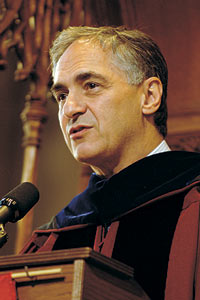 President Zimmer 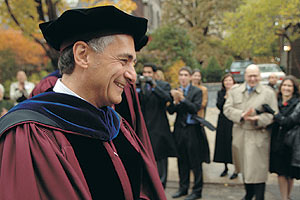 President Zimmer greets people on the procession route down University Avenue, from Henry Crown Field House at 56th Street to Rockefeller Memorial Chapel at 59th Street, on the morning of his Inaugural Convocation, Friday, Oct. 27. 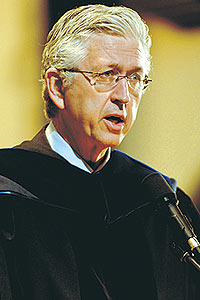 Robert Pippen, Chairman of Social Thought and the Evelyn Stefansson Nef Distinguished Service Professor in Social Thought, who chaired the faculty, presidential search committee, spoke at the convocation in Rockefeller Memorial Chapel, welcoming home Zimmer. 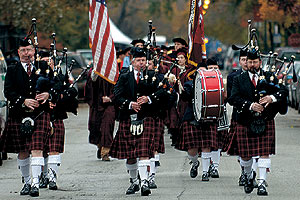 | |
University Avenue was brilliantly colorful on Friday, Oct. 27, as faculty members— dressed in yellows, greens, maroons and other colors that represented each member’s alma mater—joined President Zimmer in a procession to the Inaugural Convocation in Rockefeller Memorial Chapel, where Zimmer was inducted as the University’s 13th President.
The assembled faculty continued their march to the front of the chapel, as the Millar Brass Ensemble performed. The Inauguration Festival Orchestra, conducted by Barbara Schubert, Senior Lecturer in Music, followed the ensemble’s performance with Handel’s “Music for the Royal Fireworks” and “Water Music.”
James Crown, Chairman of the Board of Trustees, performed the induction, after which Zimmer shared his vision for his presidency during an inaugural address.
Zimmer acknowledged the long series of convocations leading to his own and observed that despite changes in society and scholarly agendas “at any time since its inception, we would know unmistakably that we were at the University of Chicago.”
He took note of how complicated the job of President is, with respect to multiple constituencies and multiple goals.
“My core responsibility as the President of the University of Chicago is—and has to be—to ensure that the University realizes its enduring values and fundamental principles in the most powerful and lasting way possible,” he said.
Zimmer said the University needs to stay true to its heritage of inquiry, while moving toward the future. “What is the lesson of this history of a university with such a clear set of enduring values? It is not that our predecessors discovered the right shape of the University once and for all, but rather that the University has flourished because those who preceded us acted with boldness, imagination and discipline.
“They advanced the University and its values for the long run by making changes within the context of the opportunities and challenges of their time. Enduring values have been the guide to action, not a sanctuary for complacency. Enduring values have not been, and should not be, confused with enduring answers,” he said.
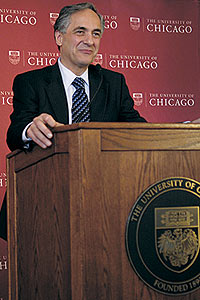 March 10, 2006 — Robert J. Zimmer is approved by the Board of Trustees to serve as the University of Chicago’s 13th President. 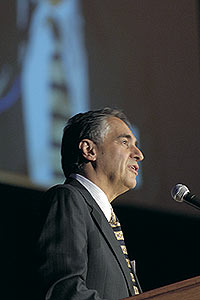 Sept. 14, 2006 — President Zimmer addresses state and city civic leaders at a dinner and reception on Navy Pier.  Oct. 27, 2006 — President Zimmer addresses members of the University community at his inauguration in Rockefeller Memorial Chapel. | |
Applause followed the address, and the convocation program then turned to the presentation of honorary degrees, which Zimmer conferred on seven internationally distinguished scholars: Sandra Faber, University Professor and Chair, Department of Astronomy and Astrophysics, University of California, Santa Cruz, who received a Doctor of Science; Michael Fried, James R. Herbert Boone Professor of Humanities and Art History, Johns Hopkins University, who received a Doctor of Humane Letters; Alex Lubotzky, Professor of Mathematics, Hebrew University of Jerusalem, who received a Doctor of Science; Hazel Markus, Davis Brack Professor in Behavioral Sciences, Stanford University, who received a Doctor of Science; Harm Pinkster, Professor of Latin, University of Amsterdam, who received a Doctor of Humane Letters; Allan Spadling, Investigator, Howard Hughes Medical Institute and Director, Department of Embryology, Carnegie Institution of Washington, who received a Doctor of Science; and Karen Strier, Hilladale Professor of Anthropology, University of Wisconsin-Madison, who received a Doctor of Science.
After Zimmer conferred the honorary degrees, music filled the chapel once again, including the singing of Chicago’s “Alma Mater.” Zimmer then was welcomed by Ian Muhlhauser, a third-year student and President of the Student Government; Robert Pippin, Chairman of Social Thought and the Evelyn Stefansson Nef Distinguished Service Professor in Social Thought; and John McGinn (A.B.,’90, M.B.A.,’93), President of the Alumni Association Board of Governors.
After reviewing the search process, Pippin, who was Chair of the Faculty Advisory Committee to the Presidential Search Committee, reflected on the faculty’s commitment to keep the University an exceptional institution devoted to promoting the life of the mind. “For a president who shares and wants to protect and contribute to the flourishing of such values, such a culture can also create great and passionate loyalty, energy and willingness to contribute to the common good,” Pippin said.
“We know that we have found such a president. We are ready to go to work with you, and we are immensely grateful that you have agreed to take on such a complicated task. We have every possible confidence in the fit between our rather anxious expectations and hopes and your commitments, experience and extraordinary talents.
“On behalf of all the faculty, thank you and welcome home,” Pippin said.
The faculty and guests recessed from the chapel to continue a day of festivities, which concluded with music and picnic-style food on the Main Quadrangle.
“I thought the ceremony captured the spirit of the University very well, and that in his inauguration speech Bob Zimmer hit exactly the right notes in laying out the challenges facing us and in reminding us that we all have to pitch in. It was a fine beginning,” Pippin said.
![[Chronicle]](/images/sidebar_header_oct06.gif)